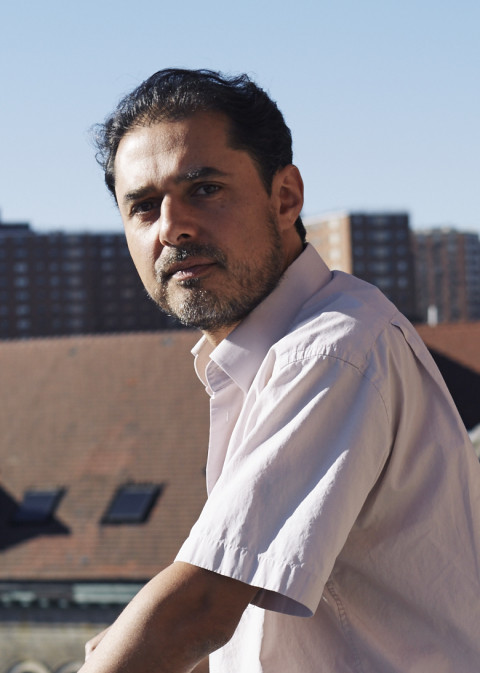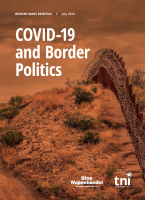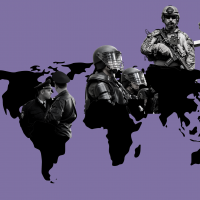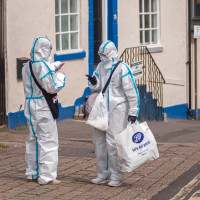The right to breathe How health is being securitised in the wake of Covid-19
Topics
In response to the Covid-19 global pandemic, governments ushered in states of emergency that saw health being securitised through the expansion of coercive policing powers and repression, a growing reliance on digital surveillance, and the criminalisation of social protest.

There are many parallels between the approach of governments to the Global War on Terror, and the kind of responses we have seen to the Covid-19 pandemic. These include restriction on movement, the shutting of borders, increased surveillance and incarceration, and an othering of those perceived as risky and to be controlled. Instead of fostering an environment of solidarity and care, coercive state responses evoked fear, suspicion and distrust.
In this series of interviews led by Arun Kundnani, we interrogate the securitisation of health in the wake of the global pandemic. We ask whether this emerging securitised environment is a proportional and necessary response to tackle a health-based crisis, and what the risks are to human rights norms and democracy.
We explore what alternative approaches that actually make people feel safer could look like, and advocate for health-based solutions grounded in solidarity and care. Arun Kundnani is a TNI associate and author of The Muslims are Coming! Islamophobia, extremism, and the domestic War on Terror.
1. Deepa Kumar: The racist roots of the War on Terror
In this fascinating conversation, Arun Kundnani interviews Deepa Kumar who traces the longer historical and racist roots of the War on Terror that in the last 20 years has killed at least one million people. They discuss how Arab and Muslim communities were racialised and targeted well before 9/11 and what interests this dehumanisation served.
Deepa Kumar is the author of the recently published book, Islamophobia and the Politics of Empire: Twenty Years after 9/11.
Editor: Josh Akinwumi
2. Olúfẹ́mi O. Táíwò: Who feels secure? Racial capitalism and global security
How did we end up in a place where security is understood in the narrow terms of policing? Why does this kind of security fail to make a large part of the population feel safer? And can we imagine a society where my security is not the opposite of your security?
In this thought-provoking video, Arun Kundnani interviews Olúfẹ́mi O. Táíwò about the destructive intersection of racial capitalism and global security, which constitute each other. They discuss how racial hierarchy is fundamentally a hierarchy in security, who benefits from keeping this hierarchy untouched, and how the concept of collaborative security can help us overcome this hierarchy. Olúfẹ́mi O. Táíwò is Assistant Professor of Philosophy at Georgetown University and a frequent writer on issues of climate justice, racism, and colonialism.
Editor: Josh Akinwumi
3. Eda Seyhan: How elites use the pandemic to secure their power
Governments around the world have used the pandemic as an excuse to expand their powers. Populations have been divided on the basis of race and class into those deserving of protection and those perceived as risky and to be controlled. Migrants, refugees, precarious workers, and racialized groups have faced vulnerability and repression. Many Western liberals, nevertheless, seem to wish for governments to be tougher in enforcing measures.
In this fascinating discussion, Eda Seyhan lays out why an abolitionist analysis of official pandemic responses is essential and what an alternative approach would look like. Eda Seyhan is an international human rights lawyer and researcher, focused on policing, national security and racial justice, and Visiting Fellow at the Institute of Postcolonial Studies.
Editor: Josh Akinwumi
4. How Big Tech captured our public health system
The privatisation of public services is a long-standing global trend. But in the wake of the pandemic and through the introduction of contact tracing apps, Big Tech has gone one step further: Large corporations like Amazon, Microsoft, and Google are now set to control the very infrastructure that underlies our public health system. In this eye-opening discussion, Arun Kundnani interviews Dr Seda Gürses about the dangers of a system in which we depend on profit-oriented companies for receiving basic health services. How did we get to this point, and how can we imagine a different future?
Editor: Josh Akinwumi
5. How powerful pharmaceutical companies shaped the response to the pandemic
During the pandemic, the World Health Organisation and governments took a back seat and power was centred on corporate interests. Health was viewed not as a right or a necessity, but as a product to be marketed and sold. Even in the midst of a global health emergency, companies treated the ill and the vulnerable as consumers and vaccines as commodities, setting prices and production rates that maximise profit. How has this happened and what, if any, are the alternatives?
Harris Gleckman is a Senior Fellow at the Centre for Sustainability and Governance at the University of Massachusetts, Boston and the Director of Benchmark Environmental Consulting. He was previously Head of the New York Office of the United Nations Conference on Trade and Development.
Editor: Josh Akinwumi
6. India - How the government's pandemic response caused more deaths
Why did the pandemic spiral out of control in India? Why did some states see many more people dying than others? The central government’s authoritarian measures, badly planned and highly restrictive lockdowns, structural inequality and many forms of discrimination drastically increased the death toll and suffering of the Indian people, argues Sulakshana Nandi in this interview. She also discusses India’s unequal vaccination rollout and how the public and private healthcare sectors differed in pandemic management. Finally, she explains what an alternative health care system in India could look like.
Sulakshana Nandi is the co-chair of the Global Steering Council of the People’s Health Movement in India. Based in Raipur, Chhattisgarh, she is involved in research, capacity building, and advocacy on issues related to health equity and access, and public policy and programmes for health and nutrition, with a focus on gender and vulnerable and indigenous communities.
Editor: Josh Akinwumi
7. Anti-Asian racism is on the rise in the US. Here's why
Why are US-China relations deteriorating? What are the impacts of growing anti-Asian racism on Asians Americans and Pacific Islanders (AAPI) living in the US? And will the new Cold War with China replace the US War on Terror?
In this interview, Tobita Chow argues that the rise of China as an economic power has become a clear threat to US hegemony. While the pandemic served as a catalyst for anti-Asian racism, it was not the root cause: Increasingly hostile foreign policy towards China leads to increasingly hostile domestic policy towards people perceived to be Asian. But AAPI communities are fighting back.
Tobita Chow is the founding Director of Justice Is Global, at the People’s Action Institute, a network of state & local grassroots power-building organizations united in fighting for justice. He is an organiser, a political educator, and a leading progressive strategist and critic regarding the US–China relationship and the rise of Sinophobia in the U.S.
Editor: Josh Akinwumi
8. Will there be another debt crisis? Current economic challenges facing the Global South
What are the economic challenges facing the Global South post-pandemic? What role have global financial institutions like the World Bank and the IMF played in worsening the economic situation for poorer countries? And what economic alternatives might exist?
In this interview, Jomo Kwame Sundaram shines a light on the effects that decades of liberalisation policy have had on countries in the global South, including deindustrialisation, food insecurity, and another looming debt crisis. He argues that the recent refusal to waive international property rights related to vaccines as well as sanctions on China have worsened the situation, with the odds increasingly stacked against poorer countries.
Jomo Kwame Sundaram is Visiting Senior Fellow at Khazanah Research Institute, Visiting Fellow at the Initiative for Policy Dialogue, Columbia University, and has previously been the Assistant Director General and Coordinator for Economic and Social Development at the Food and Agriculture Organization of the United Nations.
Editor: Josh Akinwumi
9. Why We Need to Break Big Pharma's Power
How can drug companies make huge profits from vaccines while people in the global south die from lack of access to medical care? How does the global regime of intellectual property rights enable this inequality? And what is the role of Bill Gates in defending this system?
In this interview, Dr. Mohga Kamal-Yanni argues that vaccine inequality is not a market but a policy failure. From the HIV crisis in the early 2000s to the recent pandemic, the public has repeatedly shouldered the risk for the development of life-saving medicines while private corporations have reaped obscene profits. How can we break Big Pharma’s power and develop an alternative health system?
Dr. Mohga Kamal-Yanni is the co-leader of the policy group of the People’s Vaccine Alliance. She is a senior health advisor with 40 years of experience in health policy and programming with international and national health and development agencies including multilateral agencies, NGOs and governments.
Editor: Josh Akinwumi
10. Why We Need to Abolish Borders
Borders uphold a global system of apartheid—and we should demand nothing less than their abolition. In this interview, activist and writer Harsha Walia lays out how borders and citizenship maintain colonial axes of power. From Fortress Europe outsourcing border control far into the African continent in exchange for aid, to Canada securing the availability of cheap farm workers through its selective immigration system, she demonstrates how capitalism and border regimes feed off of each other.
Harsha Walia makes a compelling case for abolition: No banks, no bombs, no borders, no bosses. Or, in her own words: “Why would we fight for anything less than the freedom of all people?”
Harsha Walia is an activist and writer based in Canada. Her books include Border and Rule: Global Migration, Capitalism, and the Rise of Racist Nationalism (2021) and Undoing Border Imperialism (2013).
Editor: Josh Akinwumi



